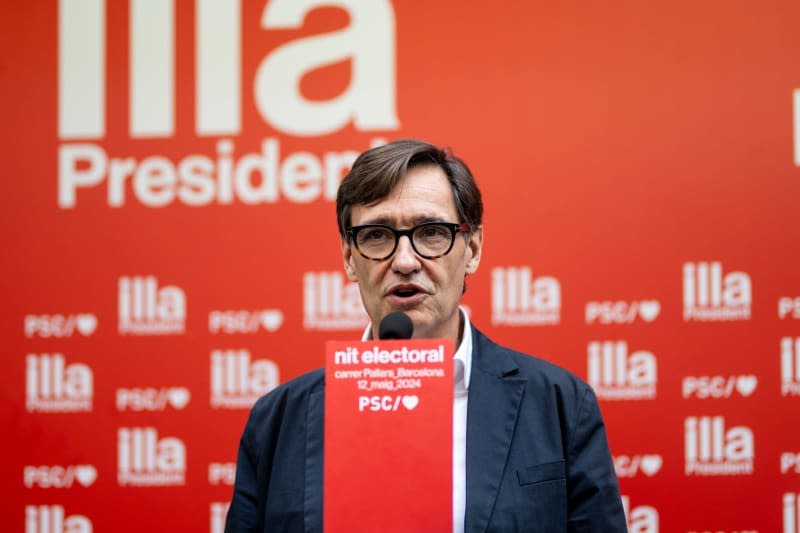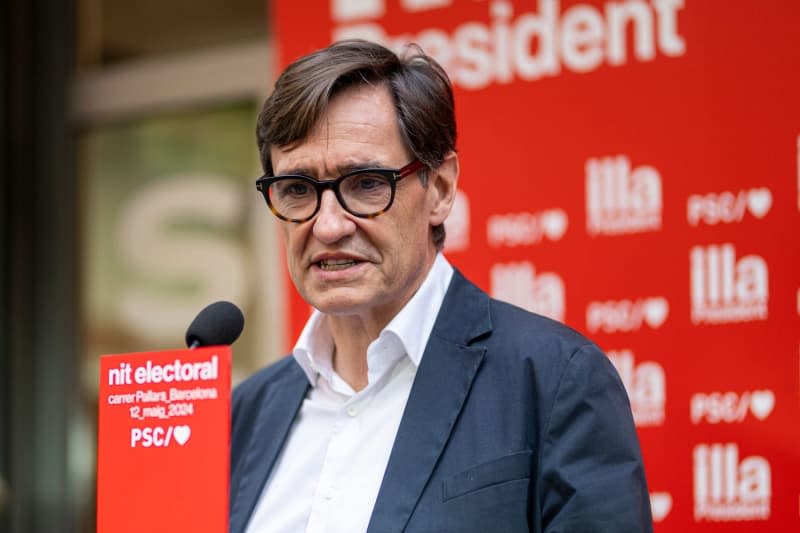Catalan separatist hopes buoyed by forecasts after election

- Oops!Something went wrong.Please try again later.
- Oops!Something went wrong.Please try again later.
Catalonia's separatist parties look set to maintain their majority in the regional parliament, according to projections from Spanish state TV RTVE.
Forecasts from late on Sunday showed the pro-independence parties are led this time by the liberal-conservative Together for Catalonia (Junts) party of former regional president Carles Puigdemont, who lives in exile.
Although the Socialist Party of Catalonia (PSC) led by top candidate Salvador Illa, came in first, with 37 to 40 seats, it is likely to have missed out on an absolute majority of 68 lawmakers.
According to RTVE, Junts has 33 to 36 seats, ahead of the separatist Republican Left of Catalonia (ERC) led by former regional president Pere Aragonès with 24 to 27 seats.
Together with the left-wing Popular Unity Candidacy (CUP), predicted to have six to eight seats, and the Catalan Alliance (Aliança Catalana), with between one and three seats and which is considered to be right-wing populist, the independence supporters can hope for an absolute majority.
At the same time, the forecasted results - which are reflected by other media - point to protracted negotiations to form a government.
If this outcome is confirmed, Puigdemont could also attempt to form a government as the runner-up.
However, the 61-year-old is still stuck in exile and wanted by the Spanish judiciary on an arrest warrant in connection with the failed first secession attempt in 2017 under his leadership. This warrant could only be lifted once an amnesty agreed with the government in Madrid comes into force, probably in June.
Although the election campaign had focussed on economic and social policies - including issues such as housing, inflation and bureaucracy - the poll was also seen as a referendum on the controversial amnesty for separatists.
Spain's Socialist Prime Minister Pedro Sánchez had hoped a poor showing for the separatists would ease the Catalan conflict and take the wind out of the separatists' sails.
If their share of the vote falls slightly at the end of the official count, this would be a success for Sánchez, who has been heavily criticized in the rest of the country for his soft stance on Catalonia.
The separatists, however, are not letting up and are demanding a green light from the central government for a legal referendum on independence.
Developments after the election could also jeopardize the stability of Sánchez's minority government, which is dependent on the votes of the separatists in the parliament in Madrid.
Critics from the conservative camp accuse Sánchez of political corruption because he used the amnesty to buy the approval of separatist MPs for his re-election last autumn.
They also claim that he is jeopardizing Spain's territorial unity by making his minority government dependent on separatists, who could force him to agree to an independence referendum after all.
Catalonia was plunged into chaos in 2017 by an independence referendum and a subsequent decision to secede from Spain declared illegal by Madrid. Puigdemont was able to flee abroad with other members of the government.
Several of those who remained in the country were sentenced to prison terms of up to 13 years, but have since been pardoned.
Catalonia is still living through the consequences of a chaotic attempt at independence - including political instability and a flight of companies and capital.


